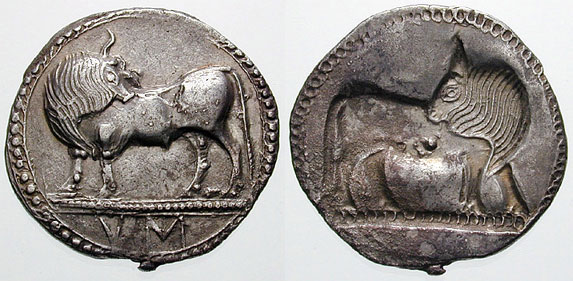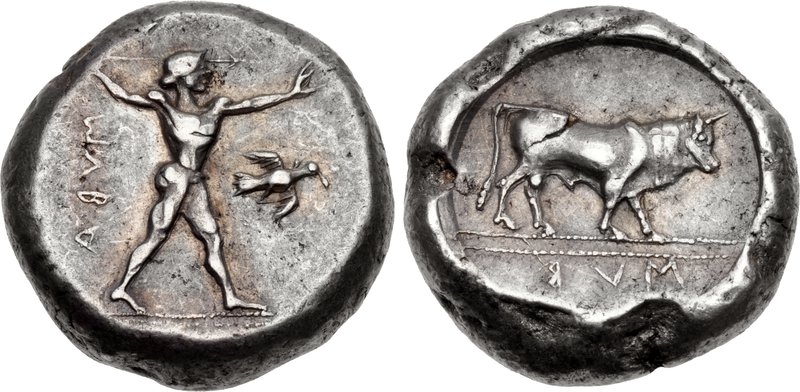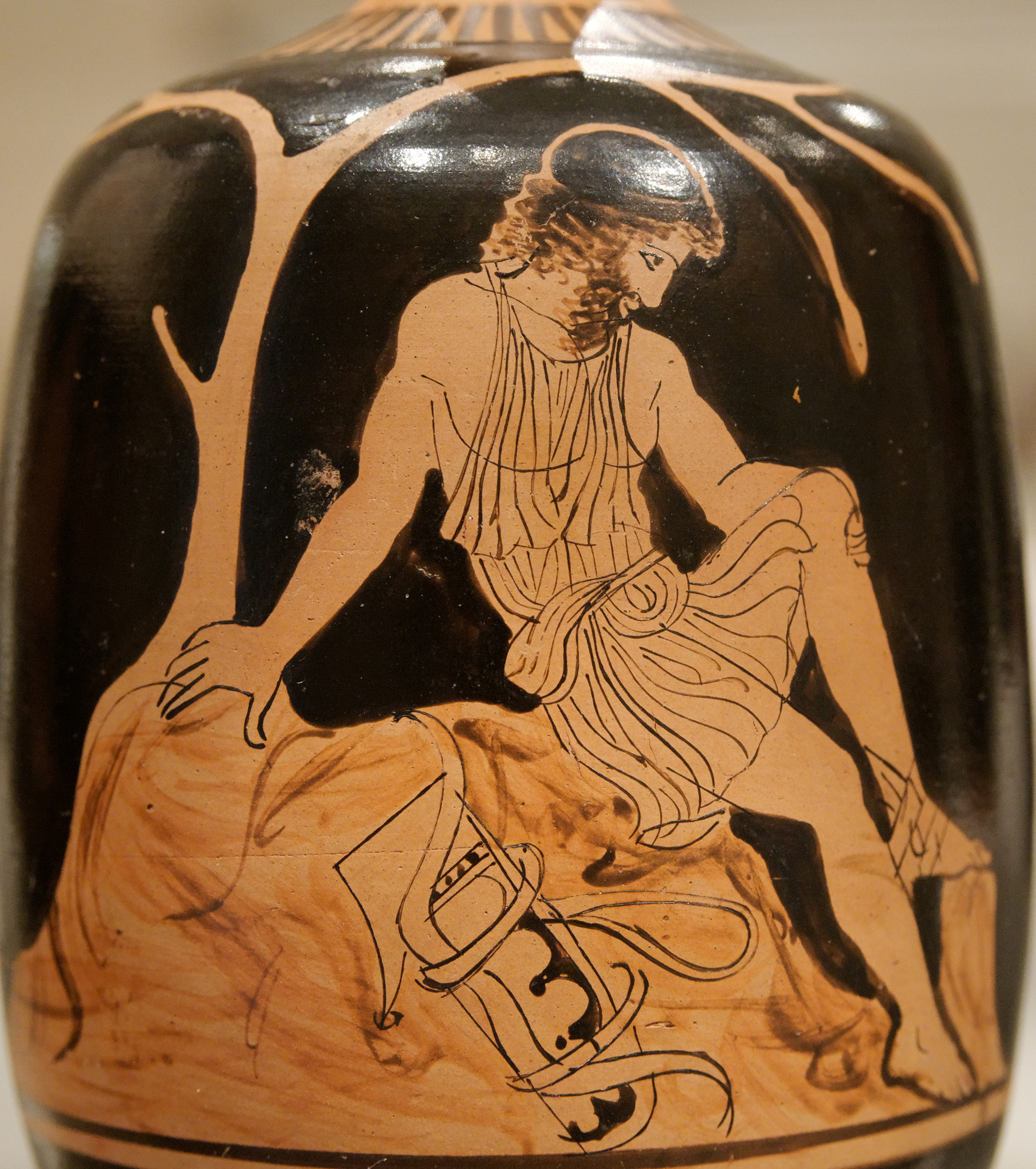|
Thurii
Thurii (; ; ), called also by some Latin writers Thūrium (compare , in Ptolemy), and later in Roman times also Cōpia and Cōpiae, was an ancient Greek city situated on the Gulf of Taranto, near or on the site of the great renowned city of Sybaris, whose place it may be considered as having taken. The ruins of the city can be found in the Sybaris archaeological park near Sibari in the Province of Cosenza, Calabria, Italy. History Foundation Thurii was founded as a colony of Athens along with exiles from Sybaris in 443 BC. Justin writes that people say that the city of Thurii was built by Philoctetes and his monument is seen there even to his days, as well as the arrows of Hercules which laid up in the temple of Apollo. The site of that city had remained desolate for a period of 58 years after its destruction by the Crotoniats; when at length, in 452 BC, a number of the Sybarite exiles and their descendants made an attempt to establish themselves again on the spot, ... [...More Info...] [...Related Items...] OR: [Wikipedia] [Google] [Baidu] |
Sybaris Archeological Park 6
Sybaris (; ) was an important ancient Greek city situated on the coast of the Gulf of Taranto in modern Calabria, Italy. The city was founded around 720 BC by Achaean and Troezenian settlers and the Achaeans also went on to found the nearby great city of Kroton 10 years later. Sybaris amassed great wealth thanks to its fertile land and busy port so that it was known as the wealthiest colony of the Greek Archaic world. Its inhabitants became famous among the Greeks for their hedonism, feasts, and excesses, to the extent that "sybarite" and "sybaritic" have become bywords for opulence, luxury, and outrageous pleasure-seeking. Sybaris also ruled over smaller colonies throughout the area, and had an ''acropolis'' at Timpone della Motta near Francavilla Marittima about 10 km distant. The city of Sybaris was destroyed in about 510 BC by its neighbour Kroton and its population driven out, but its colonies in the area continued to exist. It was replaced by a new colony under At ... [...More Info...] [...Related Items...] OR: [Wikipedia] [Google] [Baidu] |
Sybaris
Sybaris (; ) was an important ancient Greek city situated on the coast of the Gulf of Taranto in modern Calabria, Italy. The city was founded around 720 BC by Achaeans (tribe), Achaean and Troezenian settlers and the Achaeans also went on to found the nearby great city of Crotone, Kroton 10 years later. Sybaris amassed great wealth thanks to its fertile land and busy port so that it was known as the wealthiest colony of the Greek Archaic world. Its inhabitants became famous among the Greeks for their hedonism, feasts, and excesses, to the extent that "sybarite" and "sybaritic" have become bywords for opulence, luxury, and outrageous pleasure-seeking. Sybaris also ruled over smaller colonies throughout the area, and had an ''acropolis'' at Timpone della Motta near Francavilla Marittima about 10 km distant. The city of Sybaris was destroyed in about 510 BC by its neighbour Kroton and its population driven out, but its colonies in the area continued to exist. It was replaced ... [...More Info...] [...Related Items...] OR: [Wikipedia] [Google] [Baidu] |
Calabria
Calabria is a Regions of Italy, region in Southern Italy. It is a peninsula bordered by the region Basilicata to the north, the Ionian Sea to the east, the Strait of Messina to the southwest, which separates it from Sicily, and the Tyrrhenian Sea to the west. It has 1,832,147 residents as of 2025 across a total area of . Catanzaro is the region's capital. Calabria is the birthplace of the name of Italy, given to it by the Ancient Greeks who settled in this land starting from the 8th century BC. They established the first cities, mainly on the coast, as Greek colonisation, Greek colonies. During this period Calabria was the heart of Magna Graecia, home of key figures in history such as Pythagoras, Herodotus and Milo of Croton, Milo. In Roman times, it was part of the ''Regio III Lucania et Bruttii'', a region of Roman Italy, Augustan Italy. After the Gothic War (535–554), Gothic War, it became and remained for five centuries a Byzantine empire, Byzantine dominion, fully recove ... [...More Info...] [...Related Items...] OR: [Wikipedia] [Google] [Baidu] |
Herodotus
Herodotus (; BC) was a Greek historian and geographer from the Greek city of Halicarnassus (now Bodrum, Turkey), under Persian control in the 5th century BC, and a later citizen of Thurii in modern Calabria, Italy. He wrote the '' Histories'', a detailed account of the Greco-Persian Wars, among other subjects such as the rise of the Achaemenid dynasty of Cyrus. He has been described as " The Father of History", a title conferred on him by the ancient Roman orator Cicero, and the " Father of Lies" by others. The ''Histories'' primarily cover the lives of prominent kings and famous battles such as Marathon, Thermopylae, Artemisium, Salamis, Plataea, and Mycale. His work deviates from the main topics to provide a cultural, ethnographical, geographical, and historiographical background that forms an essential part of the narrative and provides readers with a wellspring of additional information. Herodotus was criticized in his times for his inclusion of "legends an ... [...More Info...] [...Related Items...] OR: [Wikipedia] [Google] [Baidu] |
Lysias
Lysias (; ; c. 445 – c. 380 BC) was a Logographer (legal), logographer (speech writer) in ancient Greece. He was one of the ten Attic orators included in the "Alexandrian Canon" compiled by Aristophanes of Byzantium and Aristarchus of Samothrace in the third century BC. Life According to Dionysius of Halicarnassus and the author of the life ascribed to Plutarch, Lysias was born in 459 BC, which would accord with a tradition that Lysias reached, or passed, the age of eighty. This date was evidently obtained by reckoning back from the foundation of Thurii (444 BC), since there was a tradition that Lysias had gone there at the age of fifteen. Modern critics, in general, place his birth later, c. 445 BC, and place the trip to Thurii around 430 BC. Cephalus#Historical persons, Cephalus, his father, was a native of Syracuse, Italy, Syracuse, and on the invitation of Pericles had settled at Athens. The opening scene of Plato's ''The Republic (Plato), Republic'' is set at the hous ... [...More Info...] [...Related Items...] OR: [Wikipedia] [Google] [Baidu] |
Pericles
Pericles (; ; –429 BC) was a Greek statesman and general during the Golden Age of Athens. He was prominent and influential in Ancient Athenian politics, particularly between the Greco-Persian Wars and the Peloponnesian War, and was acclaimed by Thucydides, a contemporary historian, as "the first citizen of Athens".Thucydides, s:History of the Peloponnesian War/Book 2#2:65, 2.65 Pericles turned the Delian League into an Athenian empire and led his countrymen during the first two years of the Peloponnesian War. The period during which he led Athens as Archon (ruler), roughly from 461 to 429 BC, is sometimes known as the "Age of Pericles", but the period thus denoted can include times as early as the Persian Wars or as late as the following century. Pericles promoted the arts and literature, and it was principally through his efforts that Athens acquired the reputation of being the educational and cultural center of the Ancient Greece, ancient Greek world. He started an ambitious ... [...More Info...] [...Related Items...] OR: [Wikipedia] [Google] [Baidu] |
Philoctetes
Philoctetes ( ''Philoktētēs''; , ), or Philocthetes, according to Greek mythology, was the son of Poeas, king of Meliboea (Magnesia), Meliboea in Thessaly, and Demonassa or Methone (Greek myth), Methone. He was a Greek hero, famed as an archer, and a participant in the Trojan War. Philoctetes was the subject of four different plays of ancient Greece, each written by one of the three major Greek tragedians. Of the four plays, Sophocles' ''Philoctetes (Sophocles play), Philoctetes'' is the only one that has survived. Sophocles' ''Philoctetes at Troy'', Aeschylus' ''Philoctetes (Aeschylus play), Philoctetes'' and Euripides' ''Philoctetes (Euripides play), Philoctetes'' have all been lost, with the exception of some fragments. Philoctetes is also mentioned in Homer's ''Iliad'', Book 2, which describes his exile on the island of Lemnos, his being wounded by snake-bite, and his eventual recall by the Greeks. The recall of Philoctetes is told in the lost epic ''Little Iliad'', where h ... [...More Info...] [...Related Items...] OR: [Wikipedia] [Google] [Baidu] |
Sibari
Sibari is an Italian ''frazione'' of the ''comune'' (municipality) of Cassano allo Ionio. It lies in the province of Cosenza which is part of the region Calabria. Geography It is located close to the Gulf of Taranto and the archaeological sites of the Ancient Greek cities of Sybaris and Thurii which can be found a few kilometers to the southeast of the town. It also has a train station. History It was founded in the 1960s. The town has grown after a program of land reclamation Land reclamation, often known as reclamation, and also known as land fill (not to be confused with a waste landfill), is the process of creating new Terrestrial ecoregion, land from oceans, list of seas, seas, Stream bed, riverbeds or lake .... In the 1980s and 1990s beach tourism developed in the town. The local agriculture produces citrus fruits, olives and rice. In recent years there have been numerous attempts to gain autonomy, which have failed. References External links Frazi ... [...More Info...] [...Related Items...] OR: [Wikipedia] [Google] [Baidu] |
Gulf Of Taranto
The Gulf of Taranto (; Tarantino: ; ) is a gulf of the Ionian Sea, in Southern Italy. The Gulf of Taranto is almost square, long and wide, making it the largest gulf in Italy, and it is delimited by the capes Santa Maria di Leuca (to the east, in Apulia) and Colonna (the ancient ''Lacinium'', to the west, in Calabria), encompassed by the three regions of Apulia, Basilicata and Calabria. The most important rivers are the Basento, the Sinni, and the Agri. The main cities on the gulf are Taranto and Gallipoli. Also the Greek colonies (Magna Graecia) of Kroton, Heraclea, Thurii, and Sybaris were founded on the Gulf of Taranto. Italy claims the whole gulf as national waters, thus closed to international traffic. This position, which is similar to that of Libya Libya, officially the State of Libya, is a country in the Maghreb region of North Africa. It borders the Mediterranean Sea to the north, Egypt to Egypt–Libya border, the east, Sudan to Libya–Sudan bor ... [...More Info...] [...Related Items...] OR: [Wikipedia] [Google] [Baidu] |
Hippodamus
Hippodamus of Miletus (; Greek: Ἱππόδαμος ὁ Μιλήσιος, ''Hippodamos ho Milesios''; c.480 BCE, 480–408 BC) was an ancient Greece, ancient Greek architect, urban planner, physician, mathematician, meteorologist and philosopher, who is considered to be "the father of European urban planning", and the namesake of the "Hippodamian plan" (grid plan) of city layout, although rectangular city plans were in use by the ancient Greeks as early as the 8th c. BC. Hippodamus was born in Miletus and lived during the 5th century BC. His father was Euryphon. According to Aristotle, Hippodamus was the first author who wrote upon the theory of government, without any knowledge of practical affairs. His plans of Greek cities were characterised by order and regularity in contrast to the intricacy and confusion common to cities of that period, even Athens. He is seen as the originator of the idea that a town plan might formally embody and clarify a rational social order. However ... [...More Info...] [...Related Items...] OR: [Wikipedia] [Google] [Baidu] |
Lampon
Lampon () was an Athenian soothsayer and interpreter of dreams and oracles. Together with Xenocritus he founded the colony of Thurii in Italy at 444 BC or 443 BC. He was called "the expounder". His father most probably was Olympiodorus. Diodorus Siculus wrote about how the colony has been established. Cratinus satirized him in his comedy Δραπετίδες. Aristophanes also mentions him. Plutarch has a story of his foretelling the ascendancy of Pericles over Thucydides Thucydides ( ; ; BC) was an Classical Athens, Athenian historian and general. His ''History of the Peloponnesian War'' recounts Peloponnesian War, the fifth-century BC war between Sparta and Athens until the year 411 BC. Thucydides has been d ... and his party. References {{reflist Classical oracles Ancient Athenians ... [...More Info...] [...Related Items...] OR: [Wikipedia] [Google] [Baidu] |







